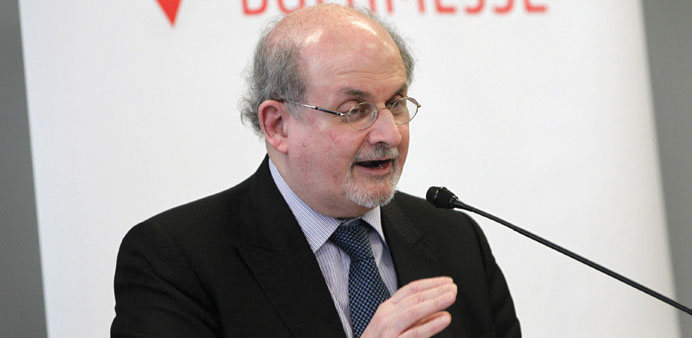Agencies/London
Prime Minister Narendra Modi’s failure to condemn a spate of attacks on free speech is giving rise to “thuggish violence” in India, author Salman Rushdie said yesterday, amid a growing protest by the literary community.
British-Indian author Rushdie said in a television interview the prime minister’s silence over a rise in attacks on dissent by right-wing and religious extremists was endangering freedom of expression.
More than 20 Indian writers have handed back awards or resigned their posts in recent weeks over what they say is institutional inaction over incidents including the August murder of secular scholar M M Kalburgi.
“I think what’s crept into Indian life now is a degree of thuggish violence, which is new,” the writer told NDTV channel from London.
“And it seems to be, I have to say, given permission by the silence of official bodies... by the silence of the Prime Minister’s Office,” he said.
In the latest apparent attack on free speech, activists of Shiv Sena party on Monday attacked Sudheendra Kulkarni, the organiser of a book launch for Pakistan’s former foreign minister Khurshid Mahmud Kasuri in Mumbai, dousing him with black ink.
Shiv Sena party is allied with Modi’s Bharatiya Janata Party government.
“Modi is a very talkative gentleman, he has a lot to say on a lot of subjects and it would be very good to hear what he has to say about all this,” Rushdie said.
Ordinary liberties, such as the right to assembly or organise an event in which people can talk about books and ideas freely seem to be in “grave danger” in India, Rushdie said.
The author, whose 1988 novel The Satanic Verses is banned in India, also told NDTV he was deluged with “10,000 hateful tweets” on Twitter for showing solidarity with the protesting writers.
“I support Nayantara Sahgal and the many other writers protesting to the Sahitya Akademi (National Academy of Letters). Alarming times for free expression in India,” he had tweeted on Monday.
Sahgal, a celebrated writer who is the niece of India’s first prime minister Jawaharlal Nehru, returned her prestigious award from the Sahitya Akademi - the country’s top literary institution - on October 6.
“In memory of the Indians who have been murdered, in support of all Indians who uphold the right to dissent, and of all dissenters who now live in fear and uncertainty,” Sahgal had said in a statement at the time.
Joining the league of writers returning their awards yesterday was Assam’s litterateur and journalist Homen Borgohain.
Writing in a vernacular newspaper in Assam, Borgohain said: “There has been a silent protest inside me since the Dadri killing (in Uttar Pradesh). But I failed to find a way to express this.
“Now after seeing at least 10 Akademi winners returning their awards one after another against the growing religious intolerance, I too felt to have got a way to express my protest.”
He wrote “however, my symbolic protest to return the Sahitya Akademi award is not only against the Dadri killing but against the growing fascist tendency in the country and against the evil forces trying to hit hard at the core ideology of Indian civilisation and culture.
“Today, I have publicly announced that I am returning the award. However, I am not aware of the process on how to return the award to the Akademi. I’ll discuss with the officials of the Akademi to complete the formality of returning the award.”
Borgohain is a well-known Assamese writer, columnist and journalist. He was awarded the Sahitya Akademi Award in 1978 for his novel Pita Putra (Father Son).

Rushdie: backs protesting writers
